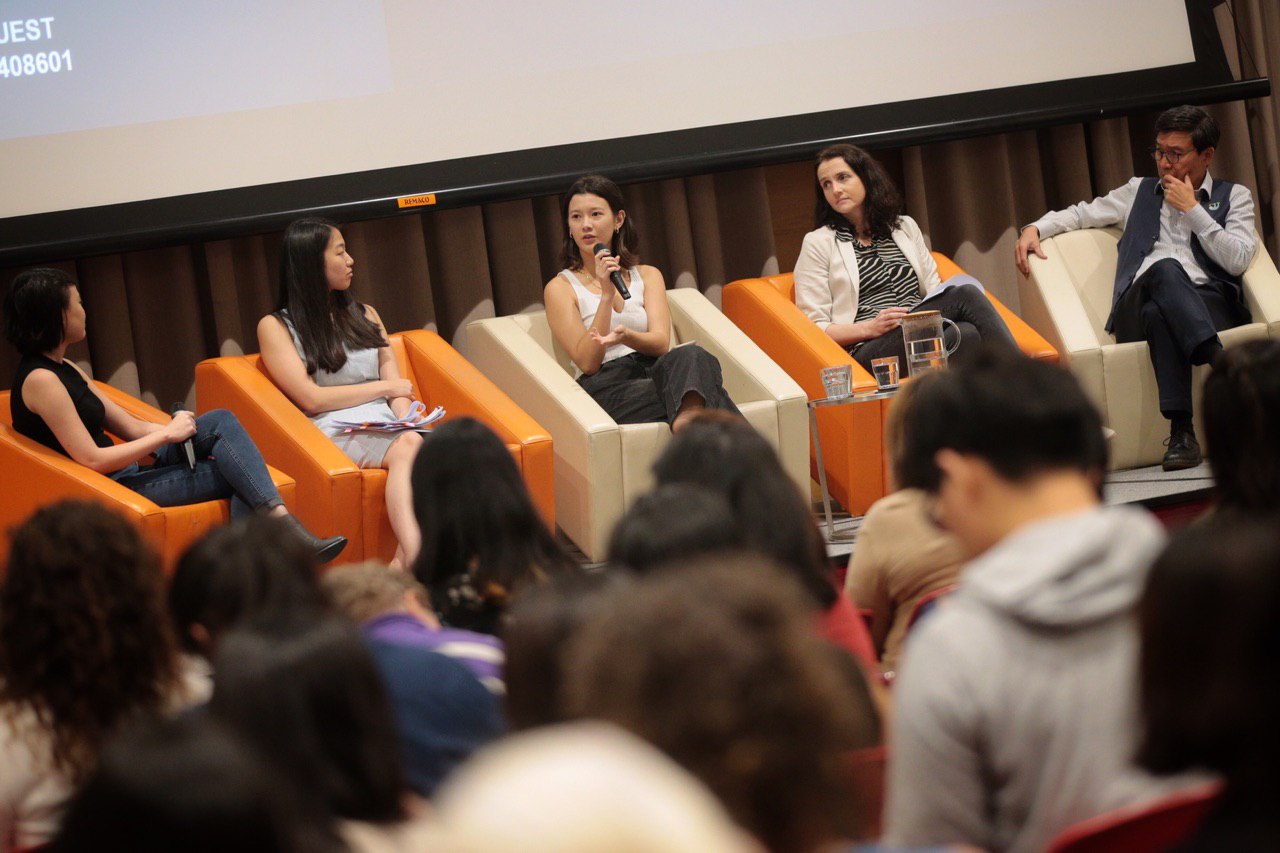Tech-enabled sexual violence cases almost triple since 2016, says Aware
Sign up now: Get ST's newsletters delivered to your inbox

(From left) Moderator Lim Xiu Xuan, senior case manager at Aware's Sexual Assault Care Centre (SACC); Ms Priscilla Chia, a litigator and volunteer lawyer with SACC; Ms Monica Baey, an advocate for survivors of sexual violence; Ms Amber Hawkes, Facebook APAC head of safety policy; and Mr Benny Bong, a counsellor at The Family Therapist and president of Society Against Family Violence; during the Taking Ctrl, Finding Alt 2019 event organised by Aware on Nov 25, 2019.
ST PHOTO: JASON QUAH
Follow topic:
SINGAPORE - The number of technology-enabled sexual violence cases reported, such as upskirting and revenge pornography, has almost tripled in the last three years, according to the Association of Women for Action and Research (Aware).
Such cases jumped from 46 in 2016, to 99 in 2017 and 124 in 2018, said Anisha Joseph, head of the gender equality group's Sexual Assault Care Centre (SACC), on Monday (Nov 25).
These cases involved acts enabled by digital communications technology such as social media and messaging platforms, digital cameras and dating apps.
The cases covered a range of behaviours including unwanted and explicit sexual messages or calls.
They also included image-based sexual abuse, which is defined as creating, obtaining or distributing images or videos of a victim without consent, such as with upskirt images.
The number of image-based sexual abuse cases has also more than doubled in the past three years, with 64 last year, up from just 30 in 2016.
Such forms of abuse include the threat to carry out the act, and can also be done even if the intimate or nude photos were taken with the victim's consent, said Aware.
While perpetrators of image-based sexual abuse can include acquaintances, family or colleagues of the victims, almost half of the cases were committed by victim's partners.
Aware also reported that two in five perpetrators of unwanted or explicit messages or calls were colleagues of the victims.
Ms Joseph said victims of image-based sexual abuse tended to approach SACC more quickly than victims in other kinds of sexual abuse cases.
In the last three years, one in two reached out to the centre within a month of the incident, as compared to general other cases where about three in five approached the centre within a year of the incident.
Speaking to a 150-strong crowd at the Taking Ctrl, Finding Alt 2019 event organised by Aware on Monday, Ms Joseph pointed out that technology is not the villain or cause of sexual violence, but rather the medium that facilitates such acts.
"We see it 'folded into' pre-existing practices of violence, harm and harassment. New factors- such as the widespread availability of recording technology and our 24/7 channels of communication - make these actions all the more pervasive and damaging today," she said.
In one case that the centre encountered, a woman was harassed by a former partner whom she had met online.
He threatened to send intimate images taken of her during consensual sex to others, including her current partner, and continued to stalk her - even taking photos of her on public transport without her knowledge.
The woman has blocked him on all platforms, but she continues to worry that he will act on his threats to release the photos or physically hurt her. She hasn't filed a police report as others have told her that this is her fault, said Aware.
Overall the total number of sexual abuse cases that the centre has seen, both with and without the use of technology, has also doubled since 2016, from 338 cases to 808 cases last year (2018).
"The conversation and media coverage on sexual violence in Singapore this year has largely been dominated by technology-facilitated sexual violence, from numerous incidents taking place on university campuses, to Telegram groups created for the dissemination of explicit images. We believe that public awareness of this issue - and public urgency to curb it - has never been higher," said Ms Joseph.
Monday's event marked both the International Day for the Elimination of Violence Against Women and the one-year anniversary of Aware's Aim For Zero campaign against sexual violence.
The panel discussion featured Ms Monica Baey, an advocate for survivors of sexual violence; Ms Amber Hawkes, Facebook APAC head of safety policy; Mr Benny Bong, a counsellor at The Family Therapist and president of Society Against Family Violence; and Ms Priscilla Chia, a litigator and volunteer lawyer with SACC.
The discussion revolved around the psychological and practical impact of tech-facilitated sexual violence on victims, as well as the legal options available to them.
Ms Hawkes also gave an overview of Facebook's policies for user safety and shared how to report a violation to the social media platform.
However, panellists agreed that there were limitations to victims' ability to contain the spread of images once they have been uploaded, as well as limitations to how perpetrators would be held accountable across platforms.
On Monday, Aware also launched a contest inviting members of the public to submit their ideas for projects to combat image-based sexual abuse. The contest is held in conjunction with the High Commission of Canada, and proposals can be submitted to http://www.aware.org.sg/tfsvcontest till Feb 7, 2020.
Winning projects will receive a "kickstarter" sum of up to $6,000, as well as development support for a six-month pilot programme next year.
Commenting on the latest figures from Aware, criminal lawyer Rajan Supramaniam said the increase is to be expected and noted that technology-facilitated sexual abuse can be committed easily under the cloak of anonymity.
He added: "A possible reason for the increase in reported cases could be that more people are misusing technology for these acts, but on a more positive note, more might also be coming forward to report incidents because of greater awareness."

